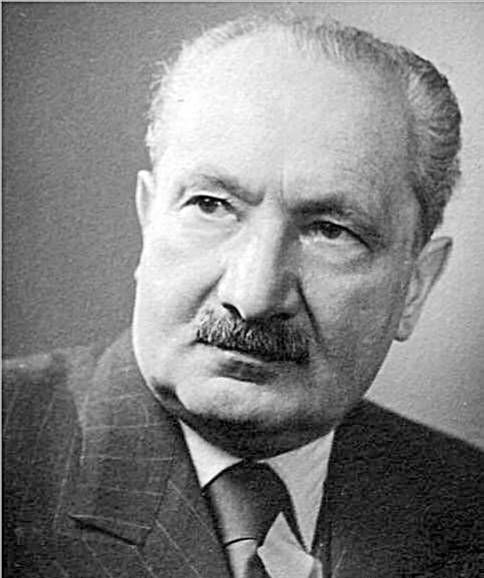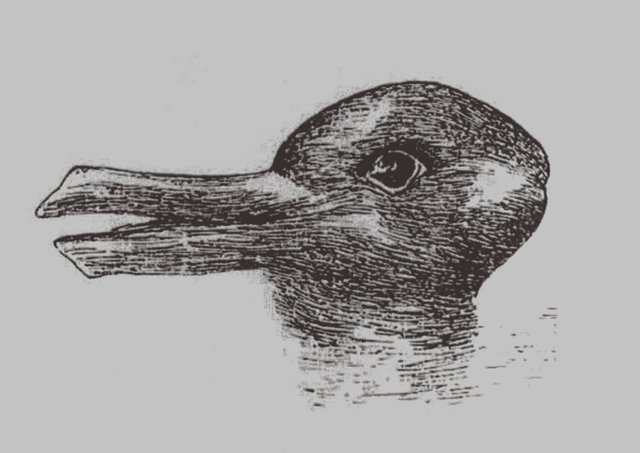There is Always More: An Essay on Living Authentically According to Heidegger
There are many different kinds of people, but one thing every one of us has in common. We all live only once (Weloo!). Few people seem to realize this, however. They let themselves get used as 'human resource' by some industry in exchange for some money. With this money they buy some property on the ‘housing market' and put an IKEA couch (nice and cheap!) in it. Thereupon they are having 'quality time'. Almost forgotten that they are alive themselves they watch real-life soaps and swipe colored balls over the screen of a tablet or phone. How did it ever come to that? Why do so many people waste their only lives by seeing themselves as part of a production process and on the other hand as a consumer? According to the German philosopher Martin Heidegger this is not something new. Already in the twenties of the last century he saw this problem taking shape. According to him, it is the result of an essential facet of human existence, although this does not mean that we cannot overcome it. We can certainly overcome this dullness, by understanding how people in principle are in the world. The way to freedom is to realize that there is always more. In what follows I explain Heidegger's reasoning behind this, and I’ll show how we can live authentically by following Heidegger. But first: who was Heidegger?
Martin Heidegger (1889 – 1976)
Although far from uncontroversial, Martin Heidegger is seen as one of the most original and important philosophers of the twentieth century. He was a pupil of Edmund Husserl (the founder of phenomenology), and has inspired many others after him, such as Sartre, Ricoeur, and Arendt. Notoriously, still, is his use of language. What Heidegger wanted to tell us was so radical, that the normal language didn’t suffice. Therefore Heidegger invented many new words, like for example Dasein (being-there), to indicate human existence. Some don’t understand this and call Heidegger's books therefore nonsensical. Also his voluntary affiliation with Adolf Hitler's party in the 1930s has made for a lot of discussion. Despite the fact that his work never explicitly deals with politics, this fact has always been overshadowing his career. Heidegger was particularly concerned with the study of being. “What does it mean to be?" he kept on wondering. He did this by making an analysis of human existence. For this he used the ‘phenomenological method'; by analyzing how people experience the world around them, he revealed the structures of human existence and showed that there is always more.
Man according to Heidegger
When Heidegger thinks about man, he doesn’t consider human being objectively as just another being with certain features among other beings. As mentioned above, he is particularly interested in the fundamental structure of how every human exists in the world. He introduces a new word for this: Dasein. This is a merging of 'da' (er) and ‘sein' (being), and thus means ‘being there’ and banally, he means man. Why then does he not just say 'man'? Firstly, he thought that the word was 'worn out' by overusing it. With the introduction of a new word, he tries to shake us up and see things with fresh eyes again. Secondly, by calling man Dasein, he puts the emphasis on the ‘always being somehwere’ Of man. This is therefore fundamental. Man is always somewhere in a world. This ensures that he can literally take a vantage point, from which he can gaze at the world around him. Even without any philosophical insight, knowledge or experience, this is the state for every human being. Being somewhere in a world as a Dasein is therefore the most primordial thing that there is to say about man’s existence. Furthermore, as a Dasein you are not only in a world, but also aware of this world.
The world
With ‘world’, Heidegger does not mean particularly the physical world, like the earth or the universe or something like that. The world is for every Dasein different and includes all circumstances and all context in which a Dasein exists. The world in which a Dasein lives also determines what is important to him and how he responds to certain situations. A football fan for example will be disappointed if his team loses, but a crash of the bitcoin will not do him much. Someone who does not care about sports, but has put all his money in bitcoins, will be devastated by a bitcoin crash, but won’t care much about football results. According to Heidegger, it makes no sense to view man separately from his world, because to understand man, you must also understand his world.
Any Daseins world, however, has a lot in common. Everyone lives in a world with time and space as dimensions, and every Dasein is also a Mitsein (a being with others), which means that fundamentally, everyone lives always already in a social world. And what is it that a Dasein does there in his world, except being? According to Heidegger, the fundamental state of man is one of care. Man cares about himself and his world(s) and wants to keep everything going well, as long as he has an authentic attitude to life. It is in living by this idea of care that Daseins life gets structure and meaning. Many of the things a man does each and every day can be understood as caring for himself and his environment. Brushing his teeth, showering, eating, working, cleaning and separating the waste are all acts that get sense and meaning in the light of the idea of care. But also less obvious things like for example your tax pay can ultimately be seen as a form of care.
According to Heidegger, care always has a structure of anticipating oneself. By continually walking ahead on what can happen, you are preparing yourself as best as possible for the any future.Man is therefore always ahead of himself. According to Heidegger, we don’t really live in the present, but more in the future. We have always been with our heads in the future, planning and anticipating all the possibilities the future can bring. In this way we are free, because we can make sure that the future becomes the way we want it. On the other hand, we are also not free, because we are limited by our past. Heidegger states therefore that we are ‘thrown’ into this world. At every moment we can always choose, but the state of ourselves and the world around us is always already determined. You can always choose from a variety of possibilities, but what these possibilities are is outside of your control.
Inauthenticity
We are also thrown into a social world. As said, a Dasein is also always a Mitsein, but the concrete social context we have to deal with is in some sense the effect of random causes. It is just a matter of in what time and culture you were born, which determines the way how people around you think and live. This thrownness in a social world is what Heidegger calls the fallenness of man. This sounds negative, but is not necessarily meant so. Life for a Dasein is very complicated and without listening to the others no one will come far. The problem is just that because of this, we tend to base our whole lives and way of thinking on that of others. Therefore, according to Heidegger, we live our lives to a large extent in a state of inauthenticity. Instead of living a life full of caring for ourselves and the world, we let ourselves get guided by the the views of the 'they', by the opinion of society, the newspapers, the talk shows and popular vlogs.
Again, this is all just as natural as man himself, and in principle there’s nothing wrong with this. There is no point in reinventing each wheel and it would also be very tiring (and lonely!) to always be authentic and don’t care at all about the others. Heidegger however, had problems with the concrete contemporary general view of our existence. In his opinion the miracle of our existence, and with it the care, was pushed too far into the background in our general worldview. Under the influence of the success of science and technology, we have been increasingly seeing ourselves as 'things among other things'. We view ourselves, because of everything we have read, heard and learned, more as an an animal among the other animals, than as a Dasein that consciously occupies a place in a world and cares about it. We see ourselves more as part of a production process and appendix of a system that must make a profit, then as a man who wants to improve the world. And we see ourselves rather as a consumer in an economy that has to run, then as a being that wants to take care of themselves and others.
Authentic Being
But are we not animals, are we not part of a production process and are we not consumers? Yes we are, says Heidegger, but we are also always more than that. Look at the picture below. What do you see? A duck? A rabbit? Or something else? Maybe a drawing?

In the same way as this is not just a picture of a duck, you are not just only a human resource nor a consumer. You are a human resource and a consumer in some sense, but you are always more than that. The authentic life for Heidegger consists therefore not of a simple return to your original self or something like that. You can't be a lonely Dasein swimming against the flow, simply because a Dasein is also fundamentally a Mitsein. You can't do without the others, for you are essentially always thrown into a social world. Living an authentic life, focusing on caring for yourself and the world around you, means that you also care for your social world. This means that you should not just turn your back to everyone. For Heidegger, being authentic means that you are aware of your own self, your throwness and your possibilities, and so choosing your own way of life. I cannot say anything about this, because it is your own choice, not mine. You just have to realize that this life and this world is your only chance to make something out of it, so you cannot afford indifference. You can perfectly follow all common views, if you agree with this on an authentic level and this is the way for you to take care of yourself and the world. You can also perfectly search another nice job in which you can improve the world in exchange for a little less money and a less comfortable couch, as long as this is a decision based on your own authentic believes. So you do not have to resign to an pointless existence as an appendix of the economic system. There is always more. Can you see it?
Nice work. You explained it really well!
Thanks man :)
@originalworks
The @OriginalWorks bot has determined this post by @roydestory to be original material and upvoted it!
To call @OriginalWorks, simply reply to any post with @originalworks or !originalworks in your message!